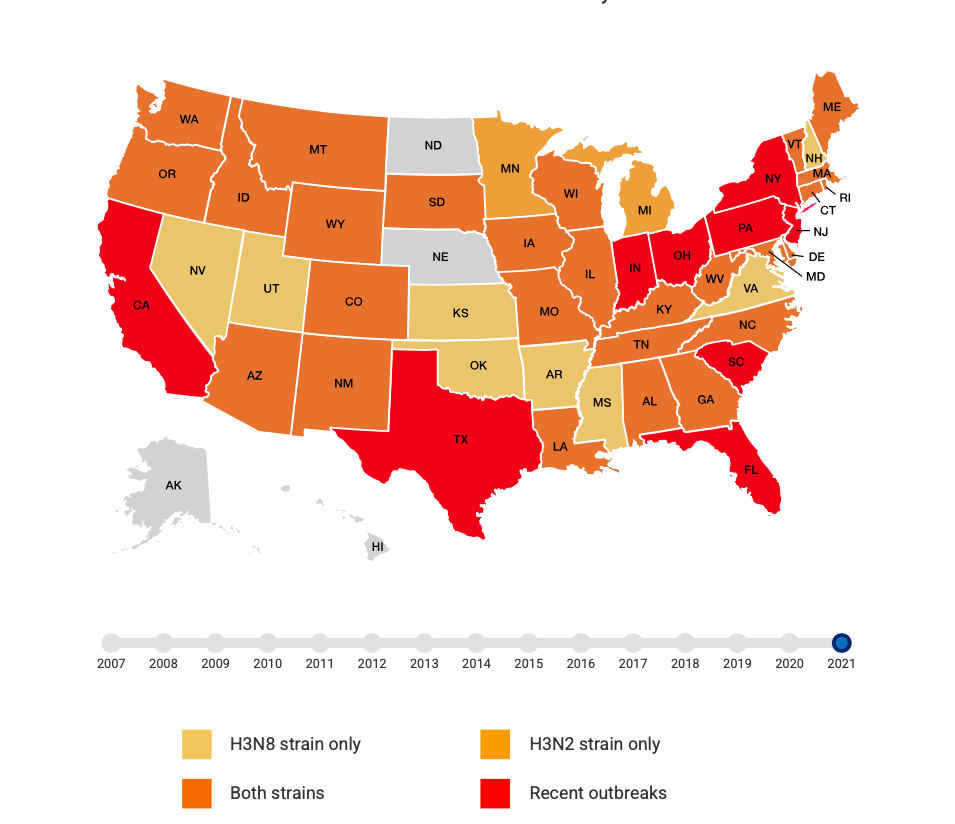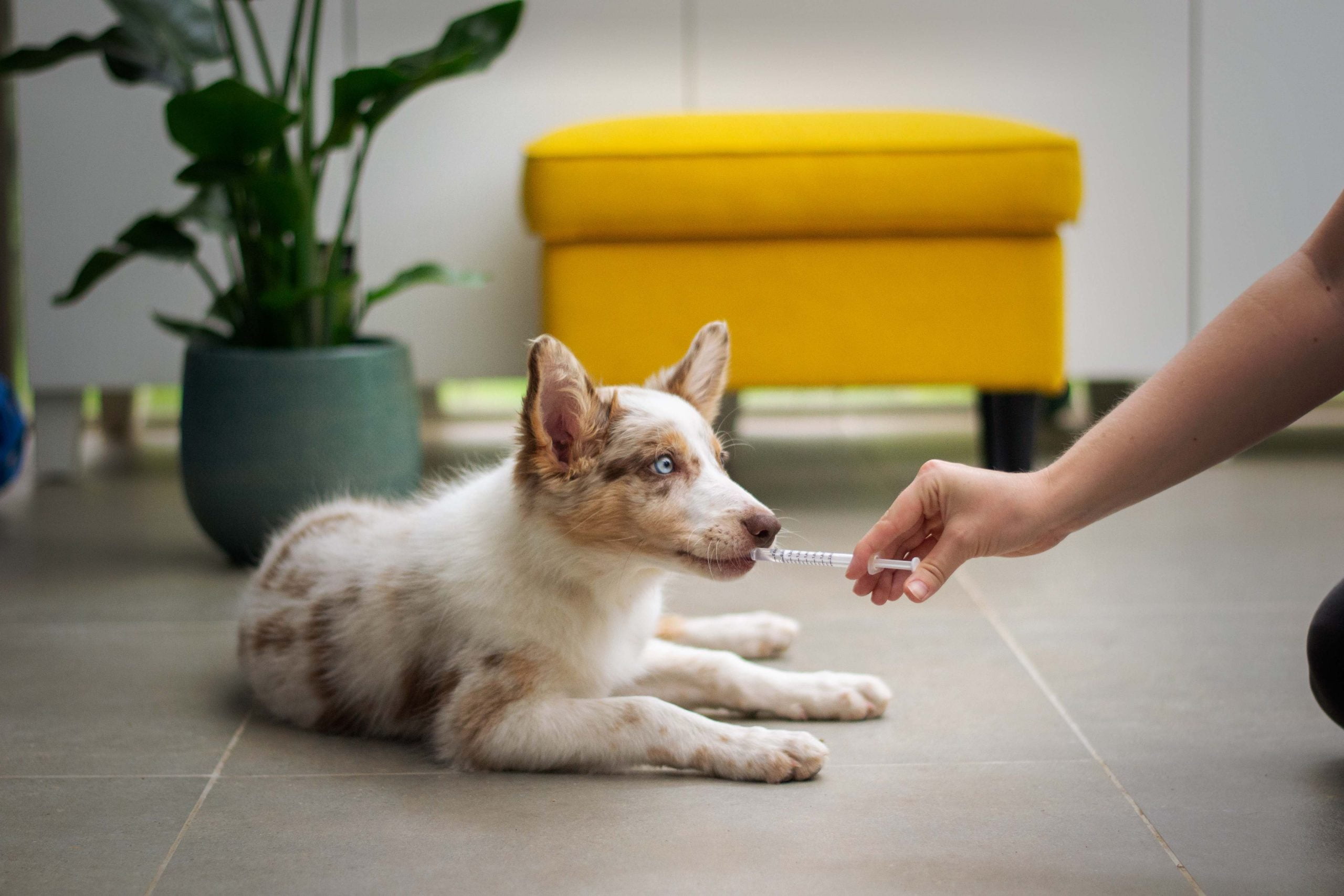The cold season is upon us, and with it comes the dreaded winter dog flu. Read on to find out what strains of canine influenza to be aware of and how to keep your dog safe this flu season.
What is dog flu?
Canine influenza, commonly called dog flu, is a contagious respiratory illness that affects dogs. Dogs contract the flu from the Type A influenza viruses that affect mostly dogs. Rarely do humans get the canine influenza virus as there is no medical evidence suggesting that humans can contract the flu.
There are two main Type A influenza viruses that cause the dog flu;
- H3N8 virus
- H3N2 virus
A little history…
The H3N8 virus first appeared in horses before dogs contracted it. The first case of H3N8 canine influenza was reported in 2004 with the virus being more prevalent among greyhounds. Fast forward, scientists believe that the virus has adapted to infect dogs and spread among them, especially those kept in kennels and shelters.
H3N2 flu originated from birds before spreading to dogs. There are also cases of H3N2 flu spreading from carts to dogs and vice versa. The first case of canine H3N2 influenza was reported in 2007 in Asia. The virus then spread from Asia to Canada before cases were reported in Chicago, USA.
Just how bad is the ongoing dog flu? Well, according to the chart below from the Dog Flu website, the infection is spreading fast and might be lurking in your backyard.

Can a dog pass the flu to a human?
Although flu symptoms appear similar in both humans and dogs, there is zero chance that humans will contract canine influenza from their pets.
How does dog flu spread?
Canine influenza
Dog flu is contagious and spreads quickly from sick dogs to healthy ones. The virus spreads in many ways but primarily through the air. An infected dog releases the virus in the air as aerosol droplets when it sneezes, coughs, or barks.
Another way the virus spreads is by direct contact with contaminated surfaces. A healthy dog may pick
by direct touch, nasal secretions (caused by barking, coughing, or sneezing), contaminated surfaces (kennel floors, food and water bowls, collars, and leashes), and human interaction with both infected and healthy dogs.
Common Symptoms of canine influenza
- Sneezing-Sneezing with a runny nose is one tell-tale sign of canine influenza.
- Coughing- Coughing develops when the infection spreads to the respiratory tract. Coughing can also be frombacterial infection.
- Fever-
- Eye and nasal discharge- discharge may be yellowing or greenish in color. Read more about treating eye infections in dogs.
- Breathing difficulties- can result in death if flu morphs into pneumonia
- Laziness or lethargy- dogs generally feel tired and lack activity when the infection advances. Laziness in puppies could also be a sign of fading syndrome.
- Reduced appetite- viral infections like dog flu can cause a dog to eat less. (More reasons for why the dog won’t eat)
5 Ways To Protect Your Dog from Canine Influenza
A dog flu outbreak can be hard to contain as medical experts explain. Fortunately, there are ways to protect your furry friend from canine influenza. Even if your dog already has the flu, there are ways to manage the symptoms and speed up the dog’s recovery.
1. Get your dog vaccinated
Vets recommend a canine influenza vaccine for dogs not yet infected with the virus. The dog flu vaccine may not be the ultimate cure, but it reduces the severity of the symptoms in case your dog gets the virus.
The flu vaccine consists of two shots administered apart. The vaccine is in the form of a nasal spray which is non-intrusive.
2. Be careful when visiting public places.
Dog parks are a high-risk ground for dog flu infection. If there is a canine influenza outbreak in your area, avoid parks, daycares, or any places that are likely to be crowded. Schedule walkies early in the morning or during weekdays when there will be less human traffic. Vaccinated dogs can visit parks, kennels, daycares, or any public place where other pets will be present.
3. Boost your dog’s immunity
Strengthening a dog’s immunity, especially that of a puppy, effectively fights the flu bug. Boost your dog’s immunity by feeding it a wholesome diet; it could be high-quality kibble or a special homemade diet whose ingredients are hand-picked by you.
4. Keep your dog hydrated.
Hydration is necessary for a sick dog recovering from the flu. Give your dog lots of water and plenty of rest during the recovery period. Another vet-approved way to hydrate your dog is by adding vitamins and electrolyte supplements to the dog’s drinking water.
An electrolyte supplement drink like Bullyade has all the 18 vitamins and minerals required by all dog breeds. Bullyade is the canine version of Gatorade and helps replenish lost electrolytes, especially in dogs that have diarrhea as a symptom of the flu bug. Bullyade is safe for any dog that is recovering from flu, parvo, or any other illness that may cause dehydration.
5. Sanitize your home
Humans can easily pick up the flu virus outside and bring it home. With the ongoing outbreak, get in the habit of disinfecting all surfaces in your home. Ensure your dog eats and drinks from a clean bowl, and keep the feeding items separate if you have more than one dog.
Conclusion
Take care of the early signs of dog flu to speed up the recovery journey for your dog. If your pup suddenly stops eating, has difficulty breathing, or is sneezing and coughing uncontrollably, take them to a local veterinary clinic to get checked.
I am a dedicated and highly experienced professional content writer and SEO expert. With a passion for creating compelling content and a deep understanding of the latest SEO techniques, I have helped numerous small businesses reach new heights of success.
My expertise lies in crafting engaging and optimized content that not only boosts website rankings but also drives meaningful conversions. I am well-versed in conducting in-depth keyword research, analyzing competitors, and determining the most effective SEO strategies for each unique business.
I am ready to bring my expertise to your team and help you achieve your digital marketing goals.
Find me on;
Website: https://manmadewebsites.com/
Email: hello@digitalmarketingchap.com


